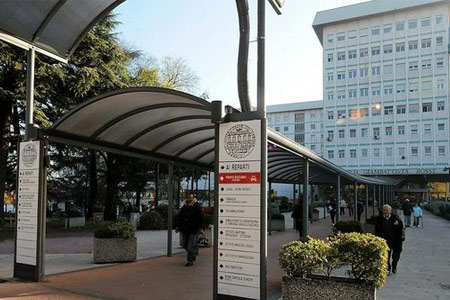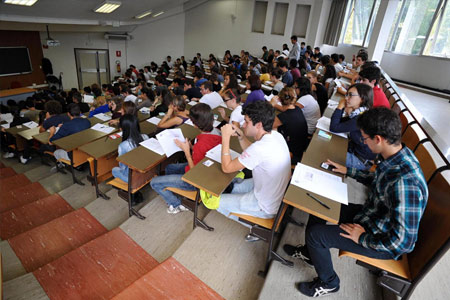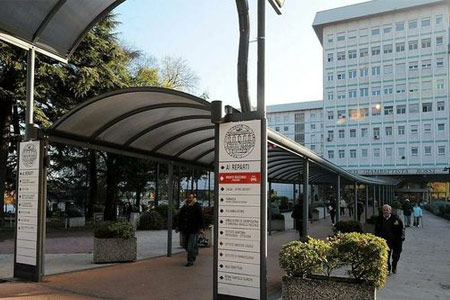- Autori:
-
Saragoni, Luca; Scarpi, Emanuela; Ravaioli, Alessandra; Morgagni, Paolo; Roviello, Franco; Vindigni, Carla; Rausei, Stefano; Chiaravalli, Anna Maria; Fumagalli, Uberto; Spaggiari, Paola; Rosa, Fausto; Ricci, Riccardo; Donini, Annibale; Giovenali, Paolo; Tomezzoli, Anna; De Manzoni, Giovanni
- Titolo:
-
Early Gastric Cancer: Clinical Behavior and Treatment Options. Results of an Italian Multicenter Study on Behalf of the Italian Gastric Cancer Research Group (GIRCG)
- Anno:
-
2018
- Tipologia prodotto:
-
Articolo in Rivista
- Tipologia ANVUR:
- Articolo su rivista
- Lingua:
-
Inglese
- Referee:
-
No
- Nome rivista:
- THE ONCOLOGIST
- ISSN Rivista:
- 1083-7159
- N° Volume:
-
23
- Numero o Fascicolo:
-
7
- Intervallo pagine:
-
852-858
- Parole chiave:
-
Definition; Early gastric cancer; Prognosis; Treatment;
- Breve descrizione dei contenuti:
- Background: Early gastric cancer (EGC) generally has a good prognosis. However, the current definition of EGC includes various subgroups of patients with different pathological characteristics and different prognoses, some of whom have aggressive disease with a biological behavior similar to that of advanced carcinoma. Materials and Methods: We retrospectively evaluated 1,074 patients with EGC who had undergone surgery between 1982 and 2009. The cumulative incidence function of cancer-specific mortality and competing mortality were estimated using the Fine and Gray method. Results: The median follow-up period was 193 months (range 1–324). Five hundred and sixty-two (52.3%) patients died, 96 (8.9%) from EGC. The 5-, 10-, and 15-year cumulative incidence rates for mortality of all causes were 20.5% (95% confidence interval [CI] 18.0–22.9), 37.1% (95% CI 34.7–40.7), and 52.6% (95% CI 49.1–56.0), respectively; for cancer-specific mortality, 6.0% (95% CI 4.5–7.6), 9.9% (95% CI 7.9–11.9), and 11.1% (95% CI 8.8–13.3), respectively; and for mortality of other causes, 14.4% (95% CI 12.1–16.6), 27.2% (95% CI 24.2–30.2), and 41.5% (95% CI 38.1–43.3), respectively. A significant increase in the risk of cancer-specific mortality was observed for lesions >2 cm (adjusted hazard ratio [HR] = 1.44, 95% CI 1.07–1.94), Pen A-type disease (adjusted HR = 1.73, 95% CI 1.15–2.61), and node-positive cancers (adjusted HR = 2.28, 95% CI 1.61–3.21). Conclusion: Patients with EGC with tumors >2 cm, Pen A-type disease according to Kodama, or lymph node metastases show a poorer prognosis and an increased risk of cancer-specific mortality. Implications for Practice: Early gastric cancer generally has a good prognosis, and some patients can be treated radically by endoscopic resection. However, the current definition of early gastric cancer includes subgroups of patients with an aggressive disease. In particular, patients with lymph node metastases and Pen A-type tumors according to Kodama's classification need a more invasive treatment, such as subtotal or total gastrectomy with an extended D2 lymphadenectomy, plus eventual adjuvant chemotherapy.
- Id prodotto:
-
101094
- Handle IRIS:
-
11562/974187
- ultima modifica:
-
11 novembre 2022
- Citazione bibliografica:
-
Saragoni, Luca; Scarpi, Emanuela; Ravaioli, Alessandra; Morgagni, Paolo; Roviello, Franco; Vindigni, Carla; Rausei, Stefano; Chiaravalli, Anna Maria; Fumagalli, Uberto; Spaggiari, Paola; Rosa, Fausto; Ricci, Riccardo; Donini, Annibale; Giovenali, Paolo; Tomezzoli, Anna; De Manzoni, Giovanni,
Early Gastric Cancer: Clinical Behavior and Treatment Options. Results of an Italian Multicenter Study on Behalf of the Italian Gastric Cancer Research Group (GIRCG)
«THE ONCOLOGIST»
, vol.
23
, n.
7
,
2018
,
pp. 852-858
Consulta la scheda completa presente nel
repository istituzionale della Ricerca di Ateneo 








